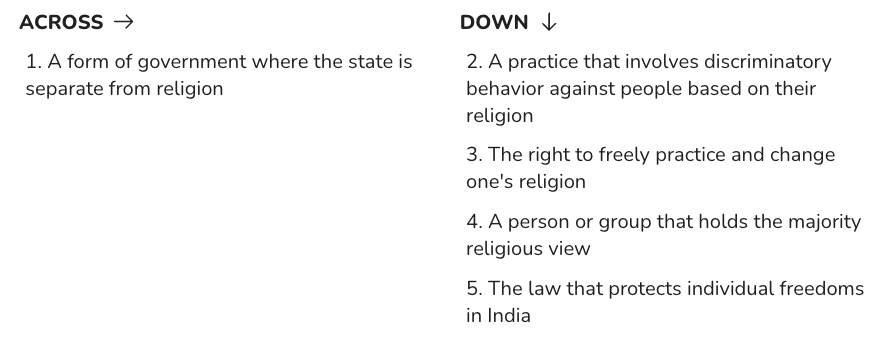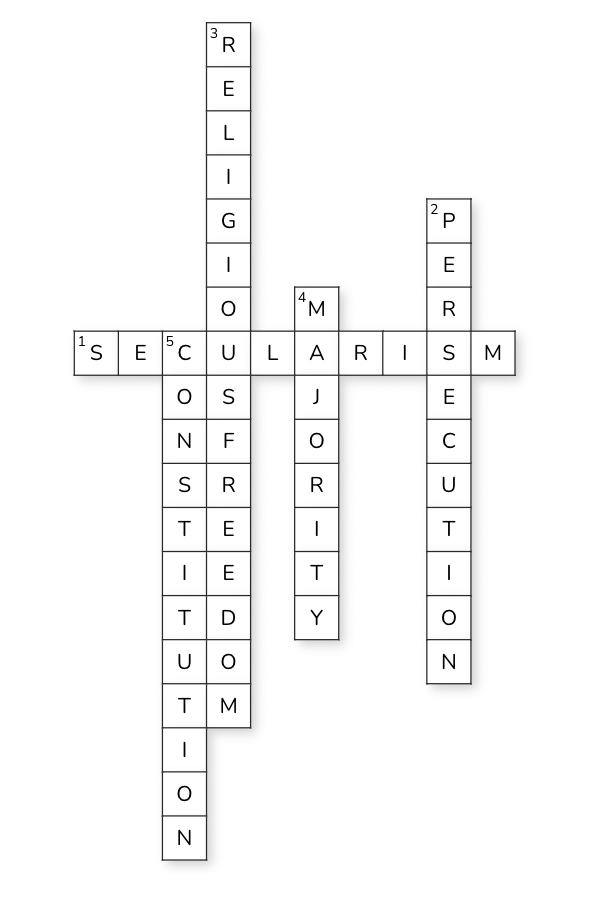Assignment: Understanding Secularism | Social Studies (SST) Class 8 PDF Download
| Table of contents |

|
| MCQs |

|
| Short Q/A |

|
| Activity-Based Questions |

|
| Research-Based Question |

|
| Crossword |

|
MCQs
What is the essence of secularism in India?
(A) The state supports a particular religion
(B) The state intervenes in religious practices
(C) The state separates religion from government policies
(D) The state promotes all religions equallySolution: (C) The state separates religion from government policies.
Secularism in India means that the government does not favor any particular religion and keeps religion separate from state functions.Why is it important for a state to be secular?
(A) To promote one religion
(B) To avoid religious domination and discrimination
(C) To control religious beliefs
(D) To enforce religious lawsSolution: (B) To avoid religious domination and discrimination.
A secular state ensures that no religious group is allowed to dominate another, ensuring equal rights for all citizens regardless of religion.What does ‘non-interference’ mean in Indian secularism?
(A) The state controls all religious practices
(B) The state interferes with religion to correct practices
(C) The state respects religious practices without intervening
(D) The state forces everyone to follow the same religionSolution: (C) The state respects religious practices without intervening.
Non-interference means that the state allows people to follow their religious practices without imposing restrictions, as long as those practices do not harm others.Which of the following is an example of Indian secularism?
(A) The government promotes one religion over others
(B) The government provides funding to religious organizations
(C) The government allows religious freedom and ensures equality
(D) The government enforces religious lawsSolution: (C) The government allows religious freedom and ensures equality.
Indian secularism allows all individuals to practice their religion freely and ensures that no religion is given preferential treatment by the state.What can happen if a majority religious group has access to state power?
(A) It can lead to equality among all religions
(B) It can result in discrimination against minorities
(C) It can encourage people to leave their religions
(D) It can strengthen the position of the stateSolution: (B) It can result in discrimination against minorities.
If the majority group controls state power, it might use that power to discriminate against religious minorities, leading to unequal treatment.
Short Q/A
What is the importance of secularism in India?
Solution: Secularism is important in India to ensure that the state does not favor any religion and that all citizens, regardless of their religion, are treated equally and fairly.How does secularism protect minority religions in India?
Solution: Secularism protects minority religions by ensuring that the state does not endorse one religion over another, and that laws are made to ensure equal treatment for people of all religions.What role does the Indian Constitution play in secularism?
Solution: The Indian Constitution ensures that the state is secular by not supporting any religion, giving citizens the freedom to practice and interpret their religion as they choose, and ensuring that religious practices do not interfere with democratic functioning.What does ‘distance from religion’ mean in the context of Indian secularism?
Solution: ‘Distance from religion’ means that the state does not support or promote any particular religion in government spaces such as schools, courts, or offices.Can the Indian state intervene in religious matters? Provide an example.
Solution: Yes, the Indian state can intervene in religious matters to protect fundamental rights, such as in the case of untouchability, which was banned to prevent discrimination within Hinduism.
Activity-Based Questions
Activity: Discuss the religious practices in your community and how they indicate religious freedom.
Solution: Students should list the different religious practices in their community, such as prayer, worship, or celebrations of different festivals. They should describe how these practices show freedom of religious expression, as people are allowed to follow their religious beliefs without interference from the state or other groups.Activity: Create a poster on religious tolerance.
Solution: Students should design a poster that promotes religious tolerance. The poster should highlight messages like "Respect all religions" and "Live and let live". The goal is to visually represent the importance of respecting diverse religious practices and beliefs.
Research-Based Question
Research: Find an example where people from different religious backgrounds came together for a common cause.
Solution: One example is the celebration of the 'Constitution Day' in India, where people from various religious backgrounds come together to honor the secular principles of the Constitution. Such events promote social harmony and respect for the diversity of religious beliefs.
Crossword


Solution: 
|
69 videos|431 docs|46 tests
|
FAQs on Assignment: Understanding Secularism - Social Studies (SST) Class 8
| 1. What is secularism and why is it important in society? |  |
| 2. How does secularism promote equality among different religions? |  |
| 3. What are some examples of secularism in practice? |  |
| 4. How can secularism contribute to social harmony? |  |
| 5. What challenges does secularism face in contemporary society? |  |




















